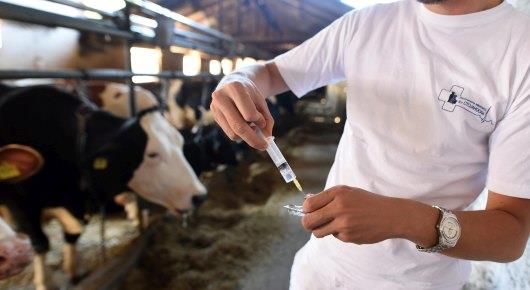Experts: ‘Use antibiotics responsibly, or face consequences’

Always seek expert advice before using antimicrobials. That is the strong recommendation of international organizations, led by FAO, the World Health Organization, and the World Organization for Animal Health (OIE).
World Antibiotic Awareness Week kicks off here today with an FAO-organized expert panel on minimizing the emergence and spread of antimicrobial resistance in the livestock sector.
Other partners include the European Union, the Swedish Board of Agriculture, and the Hungarian Food Chain Safety Office.
Antimicrobial resistance occurs when micro-organisms – bacteria, fungi, viruses, and parasites – evolve resistance to antimicrobial substances, like antibiotics. In recent years, the number and types of resistant organisms have been on the rise due to misuse and excessive use of antimicrobials – in humans, animals, even in crop farming and aquaculture.
“Antimicrobial resistance is already associated with an estimated 700 000 human fatalities annually worldwide,” said FAO animal health and production officer Andriy Rozstalnyy. “It is essential that antimicrobials are used responsibly across all sectors, and only given when really necessary.”
“There is substantial use of antimicrobials in livestock,” he added, “so it is important that we focus on improving infection-control practices, such as hygiene and biosecurity, and boosting the immunity of livestock to minimize the need to use antimicrobials.”
Additional factors behind the spread of antimicrobial resistance include poor wastewater treatment, which leads to bacteria and antibiotics getting into water supplies. Climate change is another factor, speeding the entry of animal diseases into new territories.
“The complexity of the issue is beyond question,” said Rozstalnyy. “This is the reason FAO is working closely with these partners under the ‘One Health’ approach, with multi-sectoral responses to food safety hazards, risks from zoonoses and other public health threats, and guidance on how to reduce these risks.”
Eliminating antimicrobials entirely from veterinary medicine is not a solution. Experts warn that this would create a vacuum where infectious diseases could run rampant, devastating animal and crop production and threatening public health. Antimicrobials are considered necessary for ensuring animal health and welfare.
Eliminating antimicrobials from veterinary medicine entirely
is not a solution – it would create a vacuum where
infectious diseases could run rampant.
Instead, FAO and its partners are promoting responsible and prudent use of antimicrobials. Non-therapeutic uses – for example as growth-promoters – should be minimized, they say.
Good examples of cooperation between agricultural and human health sectors exist, including public-private partnership programmes in several European countries. The case of Sweden and Hungary will be presented during today’s FAO panel.
At global level, FAO is developing guidelines to support the transition to more prudent use of antimicrobials. The Organization is calling for increased investment into sustainable and innovative agricultural practices and tools to combat antimicrobial resistance.
Antimicrobial resistance is expected to continue as a hot topic in the coming months. An expert panel will discuss it on 19 January 2018 in Berlin, at the annual Global Forum for Food and Agriculture.
10 November 2017, Budapest, Hungary
